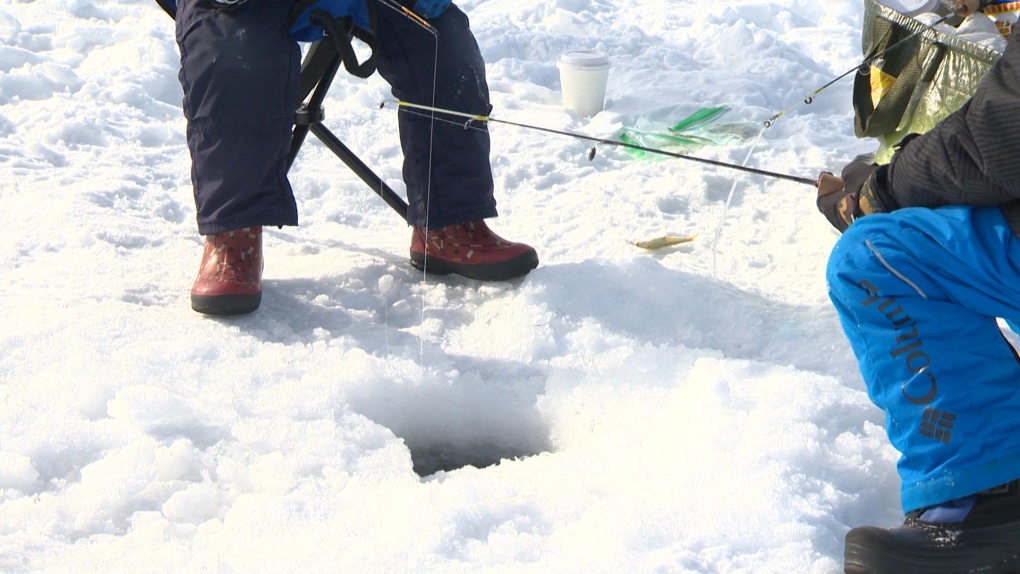Manitoba expanding overnight ice fishing program to more bodies of water

The Manitoba government is expanding its overnight ice fishing program to more bodies of water throughout the province.
Natural Resources and Northern Development Minister Greg Nesbitt announced the expansion on Wednesday, saying commercial tourism operators will be able to provide overnight accommodations on 20 waterbodies beginning this winter. This expansion allows both new and existing resource tourism operators to apply to offer this service.
“Last year was the first time Manitoba resource tourism operators had the chance to offer on-ice overnight accommodations to anglers on Lake Winnipeg and it was a resounding success,” Nesbitt said.
“I know Manitobans are enjoying summer right now but winter will be here before we know it and our government is pleased to expand the eligibility of this innovative program, which offers anglers and eco-adventure tourists a world-class winter experience.”
For the 2023/24 season, resource tourism operators will be able to offer overnight ice fishing on the following lakes:
- Lake Manitoba;
- Lake Winnipeg;
- Athapapuskow Lake;
- Cedar Lake;
- Cormorant Lake;
- Joey Lake;
- Kississing Lake;
- Lac du Bonnet;
- Lake of the Prairies;
- Lake of the Woods;
- Lake Wahtopanah;
- Oak Lake;
- Ospawagan Lake;
- Partridge Crop;
- Pelican Lake;
- Rock Lake;
- Rocky Lake;
- Tramping Lake;
- Upper Opawagan Lake; and
- Wekusko Lake.
More information on which tourism operators are eligible to apply for permits for a portable camp on ice for angling and ecotourism activities can be found online. https://www.gov.mb.ca/nrnd/accommodation/index.html “We have heard loud and clear from our members, their guests and Manitoba anglers that there is demand for overnight accommodations on ice in our province,” said Mat Hobson, president of the Manitoba Lodges and Outfitters Association.
“We are overjoyed that the Manitoba government has worked with us to develop the safe and sustainable framework that they are rolling out across our province.”
The expanded program will also include the following provisions:
- Restricting permits for certain lakes to existing operators;
- Increasing the buffer distance from developed areas to 200 metres;
- Requiring operators to affix multi-directional safety reflectors to all four corners of each accommodation unit; and
- Allowing operators to include a storage structure as part of the portable camp application.
Resource tourism operators still must meet all other environmental, safety and recreational vehicle construction standards.
CTVNews.ca Top Stories

Donald Trump says he urged Wayne Gretzky to run for prime minister in Christmas visit
U.S. president-elect Donald Trump says he told Canadian hockey legend Wayne Gretzky he should run for prime minister during a Christmas visit but adds that the athlete declined interest in politics.
Historical mysteries solved by science in 2024
This year, scientists were able to pull back the curtain on mysteries surrounding figures across history, both known and unknown, to reveal more about their unique stories.
King Charles III focuses Christmas message on healthcare workers in year marked by royal illnesses
King Charles III used his annual Christmas message Wednesday to hail the selflessness of those who have cared for him and the Princess of Wales this year, after both were diagnosed with cancer.
Mother-daughter duo pursuing university dreams at the same time
For one University of Windsor student, what is typically a chance to gain independence from her parents has become a chance to spend more time with her biggest cheerleader — her mom.
Thousands without power on Christmas as winds, rain continue in B.C. coastal areas
Thousands of people in British Columbia are without power on Christmas Day as ongoing rainfall and strong winds collapse power lines, disrupt travel and toss around holiday decorations.
Ho! Ho! HOLY that's cold! Montreal boogie boarder in Santa suit hits St. Lawrence waters
Montreal body surfer Carlos Hebert-Plante boogie boards all year round, and donned a Santa Claus suit to hit the water on Christmas Day in -14 degree Celsius weather.
Canadian activist accuses Hong Kong of meddling, but is proud of reward for arrest
A Vancouver-based activist is accusing Hong Kong authorities of meddling in Canada’s internal affairs after police in the Chinese territory issued a warrant for his arrest.
New York taxi driver hits 6 pedestrians, 3 taken to hospital, police say
A taxicab hit six pedestrians in midtown Manhattan on Wednesday, police said, with three people — including a 9-year-old boy — transported to hospitals for their injuries.
Azerbaijani airliner crashes in Kazakhstan, killing 38 with 29 survivors, officials say
An Azerbaijani airliner with 67 people onboard crashed Wednesday near the Kazakhstani city of Aktau, killing 38 people and leaving 29 survivors, a Kazakh official said.

































